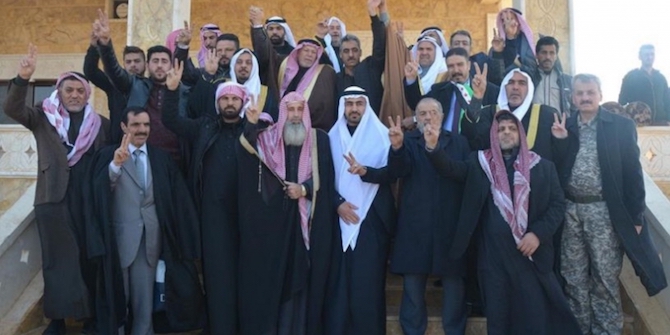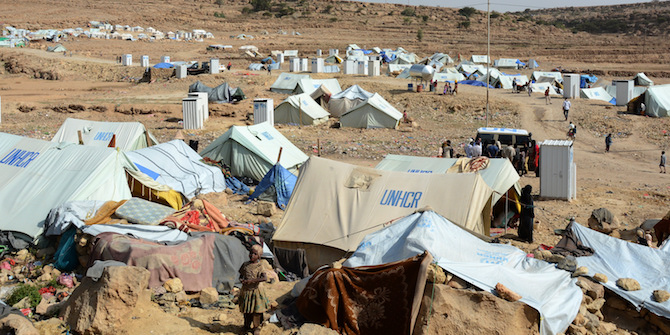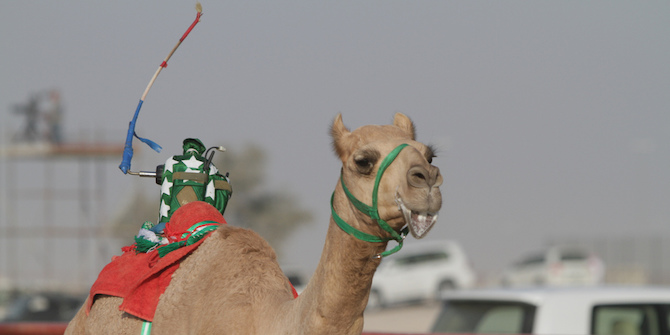by Haian Dukhan
This memo was presented part of a workshop organised by the LSE Middle East Centre on 13 June 2018, looking at Tribe and State in the Middle East.

Since the beginning of the Syrian uprising that erupted in 2011, most research has tended to focus on the resurgence of sectarianism and extremism, whereas the resurgence of tribalism has not been studied in depth. As ISIS started to gain a foothold in the eastern part of the country, interest in the Syrian tribes started to increase. Suddenly, think-tanks and research centres initiated a variety of studies on the tribes of Syria. Before this sudden interest in tribes and their role in the Syrian civil war, I argued in 2012 that research on the Syrian conflict had focused on the sectarian element, forgetting the conflict’s tribal dimension. Kinship ties, despite being weakened by factors like education, physical mobility, settlement and urbanisation, are still strong and play an important role in the Syrian conflict.
In response to the regime’s use of force against the protest movement, tribes resorted to armed self-defence against the security forces. Many soldiers and army officers from the tribes started defecting to join the armed opposition. When the Syrian regime’s forces withdrew from most of the rural areas in the north-eastern part of the country, competition among different clans arose to gain as much of the spoils of the ongoing war as possible. The most important resources were oil and gas fields, which were taken over by different clans in the countryside of Deir Ezzor and Hassakeh.
ISIS put a lot of effort into trying to persuade youths from the tribes to join its ranks. The terrorist group released many videos of tribal leaders from Baggara, Aqaydat, al-Jabbur and Bu Sha’an pledging alliance to the so-called Caliph. Using a carrot and stick approach, the group has managed to attract many tribal youth to join it. Two factors helped the group to gain a foothold in the tribal community of Syria. Firstly, the rise of Salafist ideology among the tribes after 2000, as a result of large scale migration of Syrian tribes to work in the Arab Gulf countries. Secondly, the participation of large numbers from the Syrian tribes in the Iraqi insurgency against the Americans in 2006. When the international coalition was looking for an ally on the ground to fight against ISIS, it believed that the tribes were fragmented and so could not present a united front against ISIS. Additionally, many tribal youths had already joined the group, which would complicate the efforts of forming a large tribal force to fight against ISIS.
The rise to power of ISIS in Syria complicated the relationship between the Kurds and the Arab tribes. ISIS started to exploit the rivalries between the tribes and the Kurds and between the tribes themselves to win over tribal support. The Syrian Democratic Forces (SDF) realised that they could not win against ISIS without support from the local tribes. Therefore, in order to drive ISIS out of Raqqa and Deir Ezzor, the SDF started to create alliances with local tribes that were resentful of ISIS’ rule and wanted to get rid of it. On the other hand, Turkey, which was wary of growing Kurdish power in Syria and the alliances that the SDF had started to form with Arab tribes in the region, started to play the tribal card itself. Hosting thousands of refugees from the tribes displaced as a result of the Syrian civil war, the Turkish government sponsored what was called the “Eastern Tribes Army” with the aim of resisting the attempts to take over “Arab tribal territories”, according to a statement from the meeting of the tribal leaders who announced the creation of this army in Turkey.
Regionally speaking, Saudi Arabia and its Gulf neighbours had been apprehensive regarding the “Shiite Crescent” that extends from Iran through Iraq, into Syria and to the Mediterranean shores of Lebanon. The uprising was a golden opportunity for the Gulf States to use their links inside Syria to destroy Bashar al-Assad’s regime which had given Iran an upper hand in what was meant to be their sphere of influence. Saudi state media posted many videos of women from the Syrian tribes appealing for help from their fellow tribesmen in Saudi Arabia. Existing blood ties ignited sympathies among thousands of Saudis, Kuwaitis and Qataris who donated millions of dollars to support their fellow Syrian tribesmen. The Saudis have also funded the formation of tribal militias, such as the King Abdul Aziz brigade, composed of Fad’an tribesmen in Raqqa. Iran and its allies have responded in kind, faced with the mobilisation that the Arab Gulf countries and their allies were encouraging among the Arab tribes of Syria. Iranian officials have invited Syrian tribal leaders to visit Tehran and hold talks with them on many occasions. Syrian tribal leaders’ visits have been covered by Iranian state media which portrays these sheikhs as important national figures. Iran and Hizbollah spent large amounts of money and expertise on training the tribal militias of Tay and Sheitat to fight alongside their forces in the rural areas of Syria.
The Arab Gulf countries’ attempts to use their connections with the tribes in Syria to topple the regime have failed for several reasons, including the Saudi-Qatari competition over Syria which split the tribes between these two countries, the rise of Salafism among tribal youth which pushed them to join groups like ISIS and Jabhat al-Nusra instead of joining tribal based militias, Iran’s counter efforts to reach out to the tribes and provide them with a better deal than the Saudi one and, lastly, the rivalry among many local tribes for the spoils of war after the withdrawal of the regime from their regions.
We appear to be approaching the end of the Syrian civil war. The regime and its allies will have to rely on the local tribes to preserve peace and security in the areas they managed to regain from ISIS and other rebel areas: firstly to prevent the resurgence of ISIS and secondly to cover the shortage in manpower. Tribal law and tribal reconciliation (Sulha) will play an important role in achieving peace and stability in the peripheries of Syria, but there is always the risk of tribal feuds and acts of revenge arising again after many years. Horrific acts have been committed over a long period of time by different parties involved in this war and this will not be easily forgotten.
Other posts in this Series:
- Introduction by Courtney Freer
- Tribalism in Middle Eastern States: A Twenty-first Century Anachronism? by Richard Tapper
- Tribe and State in the Contemporary Arabian Peninsula by J. E. Peterson
- Tribes and Tribalism in a Neoliberal Jordan by Jessica Watkins
- From Revolutions to Elections: When Tribes Transform State Power by Alice Wilson
- The Political Decline and Social Rise of Tribal Identity in the GCC by Steffen Hertog
- On Tribalism and Arabia by Andrew Gardner
- Tribal Modern: Branding New Nations in the Gulf by miriam cooke
- Gulf Nationalism and Invented Traditions by Natalie Koch
- Tribal Social Evolution and Gender: Conflict in Urbanized Tribal Units by Alanoud Alsharekh
- Tribal Revival in the Gulf: A Trojan Horse or a Threat to National Identities? by Maryam Al-Kuwari







6 Comments